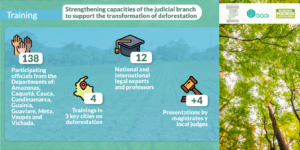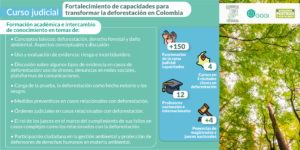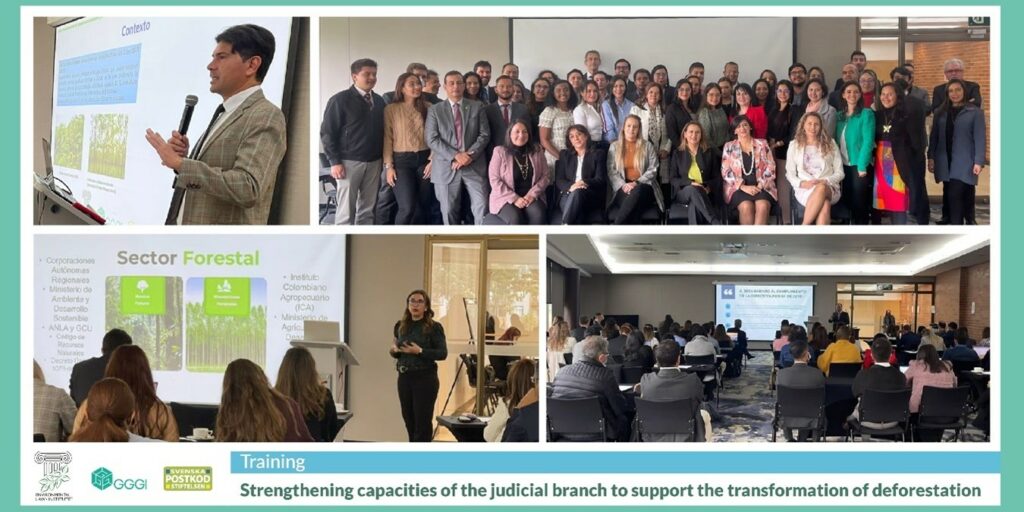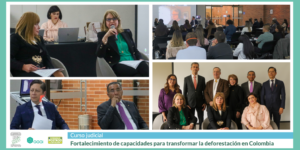Bogotá, Colombia. During the first semester of 2022, the Environmental Law Institute (ELI) together with the Global Green Growth Institute (GGGI), carried out a successful knowledge sharing experience in Villavicencio, Florencia, and Bogotá. With a two-day course, 138 officials from the judicial branch strengthened their capacities to support the transformation of deforestation in Colombia and the implementation of Law 2111 of 2021 on Environmental Crimes.
In alliance with the Swedish Postcode Foundation, and within the framework of an MOU with the Superior Council of the Judiciary, through the Rodrigo Lara Bonilla Judiciary School, the course aimed to promote effective environmental adjudication processes in the four departments most affected by illegal logging in Colombia: Caquetá, Guaviare, Meta, and Putumayo. Featuring local and international legal experts and combining sound theory approaches with case-method learning tools, the course raised awareness about the central role of judges and magistrates in fighting illegal logging and ensuring environmental rule of law.
Training objective and contents
This course sought to build judicial familiarity with the basic concepts of deforestation, the legal regime of the forestry sector, generalities about the concepts of environmental damage, and essential conceptual elements to address deforestation in judicial processes.
Module 1 Content – The use and evaluation of evidence, challenges posed by evidence derived from drone images or overflights, evidence given from communication platforms and social networks and how to handle such evidence.
Module 2 Content – Measures for before, during and after the different types of judicial processes. Participants discussed the elements to be considered when adopting precautionary or preventive measures, substantive decisions, and measures to follow up on court rulings. The role of judges in the compliance of sentences and the strengthening of their capacities to follow up and support the institutional framework in the compliance of the orders issued was also discussed.
Module 3 Content – Information, participation and environmental justice, and the protection of human rights defenders in environmental affairs.


About the project
The course was developed within the framework of the project “Transforming illegal logging through judicial education”, created by ELI in partnership with GGGI, leading Colombian universities, and Swedish legal experts.
“Unfortunately, after the peace agreement we saw a power vacuum, and armed groups and others started illegal logging and clearing land. This led to a dramatic increase in the rates of deforestation, so this project seeks to protect biodiversity, protect the climate, protect livelihoods and the rule of law, all critically important to Colombia and to the rest of the world.” highlights Carl Bruch, Senior Attorney and Director of International Programs at ELI.
This project responds to the need to build capacity of the judiciary to hear and decide on cases of illegal logging. Although there are ongoing efforts focused on strengthening the capacities of communities, prosecutors, and others to protect forests, none of these focuses on transforming the judicial culture: while cases are being investigated and brought to judges, many of them do not feel confident ruling on these issues, finding ways to not decide and putting them to the side.
In this regard, GGGI Colombia’s Country Representative Pablo Martínez explains: “Judges and judicial officials are decisive links in the fight against deforestation. As long as these crimes are properly prosecuted, the capacity of the State to persuade citizens away from environmental crimes is strengthened. This reinforces the policies to tackle deforestation and promotes the generation of green economic alternatives for the communities, issues that GGGI supports in Colombia and at a territorial level in the departments of Antioquia, Meta, Guaviare, Nariño, Putumayo, and Caquetá.”

